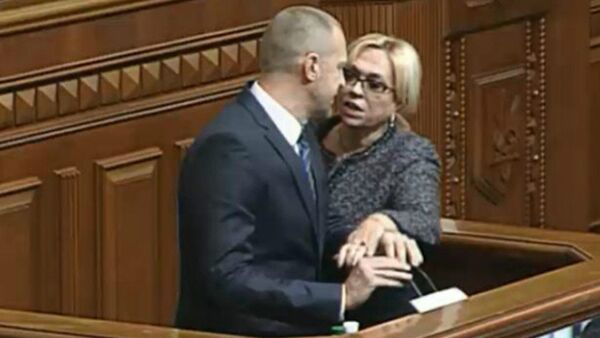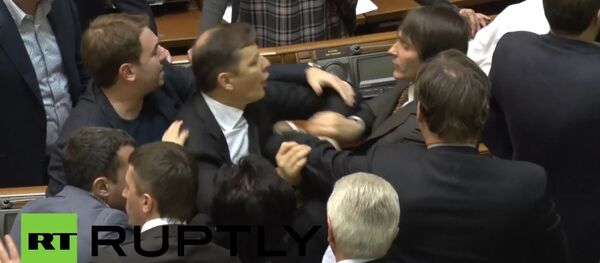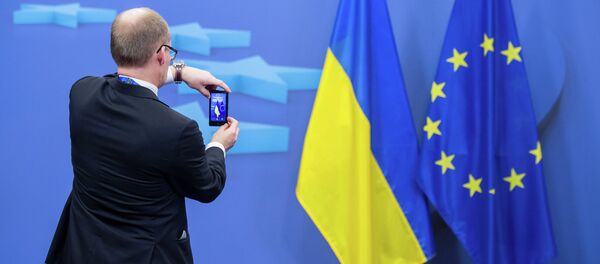Last Thursday, another round of fisticuffs broke out in the halls of Ukraine's parliament, after Andriy Teteruk, a member of Prime Minister Arseniy Yatsenyuk's People's Front, hit Fatherland MP Alexandra Kuzhel over the head with a glass bottle, sending her to the hospital with a concussion.
Teteruk, the commander of the notorious Myrotvorets territorial defense battalion, justified his attack on his female colleague by explaining that she had tried to hit him with her handbag, forcing him to retaliate.
Setting aside the details of the fight itself (they're standard fare as far as the day-to-day business of the Rada is concerned), what's important here, according to journalist Andrei Polunin, is that this particular fight may have important implications as far as Ukraine's European aspirations are concerned.
In his piece, published Sunday by news and analysis portal Svobodnaya Pressa, Polunin explained that while melees in Ukraine's parliament are nothing out of the ordinary, "happening so often that they've almost become one of the prerequisites for being a people's representative," what's different this time is that "Europe is paying attention."
The reason for this, according to the journalist, is that the MPs from the Yulia Tymoshenko's Fatherland Party (a member of the governing coalition government) "have vowed that they will not participate in future sessions of the parliament so long as Teteruk is not stripped of his mandate."
It could also mean the cancellation of the planned trip to Brussels by Ukrainian lawmakers, where the fate of the visa-free regime was to be decided.
Deutsche Welle recalled that the Rada has already failed, repeatedly, to adopt a series of anti-discrimination amendments to its labor code, as well as the anti-corruption measures demanded by Brussels.
Ultimately, the newspaper suggested that Ukraine's lawmakers have not fully realized what they've done, given that "the stakes in this game are not even just the visa-free regime with the EU, but the future of the Ukrainian state itself. The fighting in the Rada may now postpone Ukraine's move toward Europe."
"In other words," Polunin noted, "MP Teteruk may have been aiming his bottle at Kuzhel's head, but ended up hitting the Europeans, leaving them dazed and confused."
Commenting on the sordid affair, Russian Institute for Strategic Studies Deputy Director Tamara Guzenkova explained that "the project for Ukraine's European integration is in part a propaganda façade, and in part associated with the real processes taking place in the country." In turn, "the fight in the parliament has broken loose of the advertised picture, thus drawing the attention of European and American observers."
In this sense, according to the expert, the fight serves as a blow to the "public relations" aspects of Ukraine's reform. Still, with the Ukrainian parliament "known for a long time for its brawling tradition," the Guzenkova suggests that ultimately, "the fate of European integration in the long run will depend not on the Ukrainian lawmakers themselves, but on whether Brussels and Washington will be willing to close their eyes" to such behavior.
As far as Brussels is concerned, Guzenkova emphasizes the supranational union's bureaucracy is well known for its skillful ability to postpone fulfilling their promises, citing the failure of the applicant country to fulfill their obligations. On the other hand, she notes that another, much more worrying tendency also exists, "where for geopolitical reasons, a country which is clearly not prepared for integration is accepted almost instantly."
"In any case," the expert notes that "in its current form, the Ukrainian project is a headache for both Eastern and Western Europe. At the moment, the West remains committed to the carrot and stick approach to forcing Kiev to take the necessary measures. But the process is complicated by the fact that the West does not fully understand what it should do with the country. Thus, in order to avoid aggravating the situation inside Ukraine, the West makes psychotherapeutic gestures, speaking about the possibility of integration."
Bogdan Bezpalko, Deputy Director of the Center of Ukrainian and Belorussian Studies at Moscow State University, also suggests that Kiev's reform efforts ultimately have little effect on Brussels' choice about whether or not to begin the integration process. Moreover, citing the example of Turkey, which was left hanging after carrying out virtually all the necessary reforms, the expert noted that he is not so sure about Ukraine's chances.
And this may be for the best, according to Bezpalko. "Romania, Bulgaria and the Baltic countries achieved integration, but now all of them are faced with the outflow of young people and the degradation of their economies, with political pressures from Brussels forcing them to abandon profitable economic projects. In fact, having lost a part of their sovereignty, these countries really haven' gained anything in return –except, perhaps, certain benefits for their officials."
"They are afraid," the journalist notes, "and not without reason, that it could result in many of the country's 40 million people immediately abandoning their homes in an attempt to settle down in Europe. Such fears are only exacerbated in a situation where the EU is already showing signs of strain from the crowd of migrants from the Middle East and North Africa."
And while Ukrainians are not from a cultural background which is radically different from Europeans, and therefore "do not pose a threat to Europe's ethnic and religious balance, this is not enough of an argument for integration."




